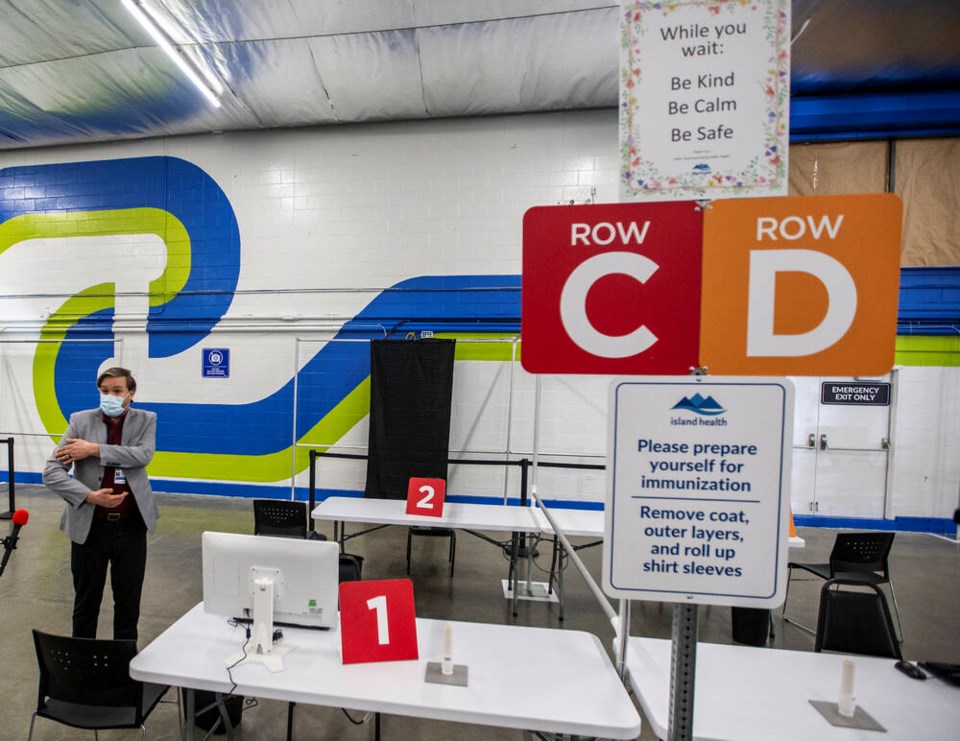A group of public-health experts is calling on the province to make rapid COVID-19 tests freely available to the public, as the province hit its highest-ever daily COVID-19 case count.
Island Health added 176 new COVID-19 cases Wednesday as the province’s daily case count of 1,474 broke a record set Tuesday, when there were 1,308 new cases. The previous daily high was 1,293 reported on April 8.
The Island now has a total of 1,146 active cases.
The province has said the supply of rapid antigen tests is expected to increase significantly next month, with about 11 million tests coming from the federal government.
But the distribution will continue to be limited to long-term care facilities, health-care workers at acute sites, rural, remote and Indigenous communities, eligible businesses and organizations and regional health authorities.
A limited supply of rapid tests might also be available for purchase at some pharmacies for about $50 for two, or through online suppliers.
A group of public health experts called Protect our Province B.C. wants the province’s supply of rapid tests released to the public for free, especially as Island Health sees a surge in demand for PCR testing. The health authority had been seeing about 600 calls for testing on a weekend day, but that has spiked to about 2,400 daily calls this week.
Island Health said a “large portion” of those calls are from asymptomatic people who want a test for social reasons and they’re asking people to seek appointments only if they have symptoms or have been exposed.
From the time someone calls to book an appointment, it could take up to five days to receive a test result.
Damien Contandriopoulos, a member of Protect our Province B.C. and a professor in the school of nursing at the University of Victoria, said rapid tests could be the “missing link” that allows people who are feeling a little bit unwell to better assess their risk level.
Rapid antigen tests can be done at home and deliver results within an hour, but they are not as sensitive as PCR tests for detecting COVID-19 in people who have no symptoms. Experts say it’s best to view rapid tests as a snapshot of a particular moment in time. They might not detect the virus in the earliest stages of infection, but a subsequent test taken a day or two later could give a different result.
“Rapid tests are very effective at finding out if someone is infectious,” said Contandriopoulos, adding it’s “mind boggling” that B.C. won’t make the tests available to the public.
On Tuesday, provincial health officer Dr. Bonnie Henry said B.C. does not have enough rapid tests and needs to reserve them for people with symptoms. She said public health officials will monitor the effectiveness of the use of rapid tests.
Federal data shows that as of Dec. 10, the province had received almost 3.4 million tests and distributed less than half of those, or 1,261,098. About 10 per cent of all tests received, 326,019, have been used.
Most provinces have made rapid tests available to the public, with varying degrees of success, Contandriopoulos said.
In Nova Scotia, the widespread availability of rapid tests was seen as part of the province’s successful strategy to tamp down the virus. In mid-December, people were encouraged to pick up a pack of five rapid tests from public libraries to use ahead of holiday gatherings, but as cases in the province skyrocket, new restrictions on testing are expected next week.
Ontario is making up to two million rapid tests available in malls, retail settings, holiday markets, public libraries and transit hubs, although long lines sometimes starting in the middle of the night have meant many leave empty-handed.
“I suspect that if tests are made available, people will just rush and try to get some, which is not great, but it’s still better to use an approach that makes tests available,” Contandriopoulos said.
B.C. seniors advocate Isobel Mackenzie added her voice to calls to release rapid tests to the public so people can test themselves before visiting elderly loved ones, who are more vulnerable to the virus.
As cases surge, the University of B.C. announced Wednesday that most classes would move temporarily online at both its Vancouver and Okanagan campuses. In a statement, university president Santa Ono says campuses will remain open but instruction after the holiday break will be provided online until at least Jan. 24.
Ono says they intend to allow in-person learning after that, but university officials will monitor the situation and provide an update in the first week of the new year.
Some courses, including those with clinical or performance and studio components, are set to continue in-person with safety protocols in place.
The University of Victoria said in a notice posted on Monday that it was awaiting public health direction later this week as it works to determine whether any adjustments are needed for the spring term.
The university said its protocols so far have worked well, noting it has not had any cases of COVID-19 transmission in classrooms for 22 months.
Starting in early January, Island Health once again plans to use part of Esquimalt’s Archie Browning Sports Centre as a vaccine clinic. The recreation centre was used as a clinic in the spring of this year but returned to normal operation in the fall.
The opening date has not yet been set. Access to the curling rink, where the clinic will take place, is now closed. Ice hockey and public skating are still possible.
— With a file from The Canadian Press





